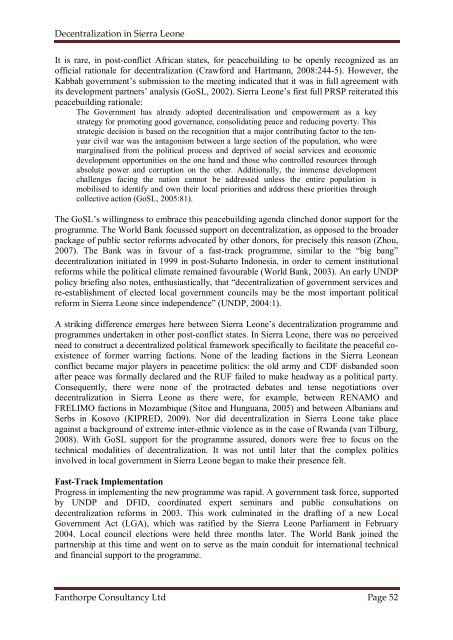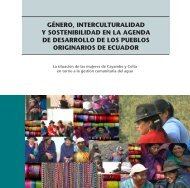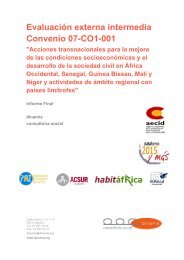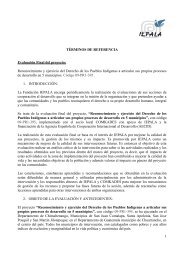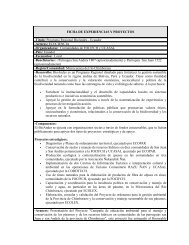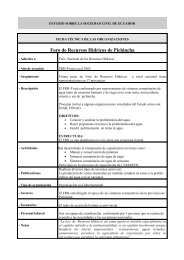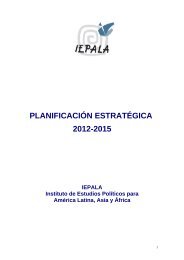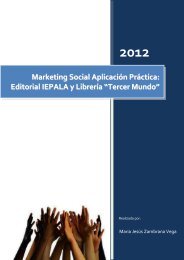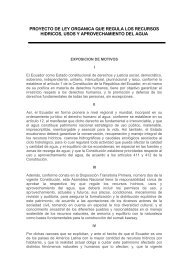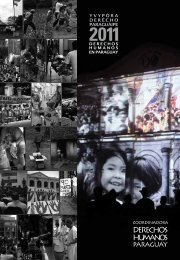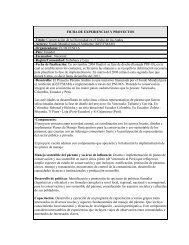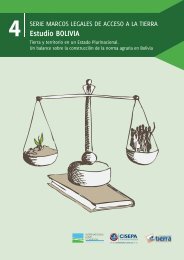Decentralization in Sierra Leone - Research for Development
Decentralization in Sierra Leone - Research for Development
Decentralization in Sierra Leone - Research for Development
Create successful ePaper yourself
Turn your PDF publications into a flip-book with our unique Google optimized e-Paper software.
<strong>Decentralization</strong> <strong>in</strong> <strong>Sierra</strong> <strong>Leone</strong>It is rare, <strong>in</strong> post-conflict African states, <strong>for</strong> peacebuild<strong>in</strong>g to be openly recognized as anofficial rationale <strong>for</strong> decentralization (Craw<strong>for</strong>d and Hartmann, 2008:244-5). However, theKabbah government’s submission to the meet<strong>in</strong>g <strong>in</strong>dicated that it was <strong>in</strong> full agreement withits development partners’ analysis (GoSL, 2002). <strong>Sierra</strong> <strong>Leone</strong>’s first full PRSP reiterated thispeacebuild<strong>in</strong>g rationale:The Government has already adopted decentralisation and empowerment as a keystrategy <strong>for</strong> promot<strong>in</strong>g good governance, consolidat<strong>in</strong>g peace and reduc<strong>in</strong>g poverty. Thisstrategic decision is based on the recognition that a major contribut<strong>in</strong>g factor to the tenyearcivil war was the antagonism between a large section of the population, who weremarg<strong>in</strong>alised from the political process and deprived of social services and economicdevelopment opportunities on the one hand and those who controlled resources throughabsolute power and corruption on the other. Additionally, the immense developmentchallenges fac<strong>in</strong>g the nation cannot be addressed unless the entire population ismobilised to identify and own their local priorities and address these priorities throughcollective action (GoSL, 2005:81).The GoSL’s will<strong>in</strong>gness to embrace this peacebuild<strong>in</strong>g agenda cl<strong>in</strong>ched donor support <strong>for</strong> theprogramme. The World Bank focussed support on decentralization, as opposed to the broaderpackage of public sector re<strong>for</strong>ms advocated by other donors, <strong>for</strong> precisely this reason (Zhou,2007). The Bank was <strong>in</strong> favour of a fast-track programme, similar to the “big bang”decentralization <strong>in</strong>itiated <strong>in</strong> 1999 <strong>in</strong> post-Suharto Indonesia, <strong>in</strong> order to cement <strong>in</strong>stitutionalre<strong>for</strong>ms while the political climate rema<strong>in</strong>ed favourable (World Bank, 2003). An early UNDPpolicy brief<strong>in</strong>g also notes, enthusiastically, that “decentralization of government services andre-establishment of elected local government councils may be the most important politicalre<strong>for</strong>m <strong>in</strong> <strong>Sierra</strong> <strong>Leone</strong> s<strong>in</strong>ce <strong>in</strong>dependence” (UNDP, 2004:1).A strik<strong>in</strong>g difference emerges here between <strong>Sierra</strong> <strong>Leone</strong>’s decentralization programme andprogrammes undertaken <strong>in</strong> other post-conflict states. In <strong>Sierra</strong> <strong>Leone</strong>, there was no perceivedneed to construct a decentralized political framework specifically to facilitate the peaceful coexistenceof <strong>for</strong>mer warr<strong>in</strong>g factions. None of the lead<strong>in</strong>g factions <strong>in</strong> the <strong>Sierra</strong> <strong>Leone</strong>anconflict became major players <strong>in</strong> peacetime politics: the old army and CDF disbanded soonafter peace was <strong>for</strong>mally declared and the RUF failed to make headway as a political party.Consequently, there were none of the protracted debates and tense negotiations overdecentralization <strong>in</strong> <strong>Sierra</strong> <strong>Leone</strong> as there were, <strong>for</strong> example, between RENAMO andFRELIMO factions <strong>in</strong> Mozambique (Sitoe and Hunguana, 2005) and between Albanians andSerbs <strong>in</strong> Kosovo (KIPRED, 2009). Nor did decentralization <strong>in</strong> <strong>Sierra</strong> <strong>Leone</strong> take placeaga<strong>in</strong>st a background of extreme <strong>in</strong>ter-ethnic violence as <strong>in</strong> the case of Rwanda (van Tilburg,2008). With GoSL support <strong>for</strong> the programme assured, donors were free to focus on thetechnical modalities of decentralization. It was not until later that the complex politics<strong>in</strong>volved <strong>in</strong> local government <strong>in</strong> <strong>Sierra</strong> <strong>Leone</strong> began to make their presence felt.Fast-Track ImplementationProgress <strong>in</strong> implement<strong>in</strong>g the new programme was rapid. A government task <strong>for</strong>ce, supportedby UNDP and DFID, coord<strong>in</strong>ated expert sem<strong>in</strong>ars and public consultations ondecentralization re<strong>for</strong>ms <strong>in</strong> 2003. This work culm<strong>in</strong>ated <strong>in</strong> the draft<strong>in</strong>g of a new LocalGovernment Act (LGA), which was ratified by the <strong>Sierra</strong> <strong>Leone</strong> Parliament <strong>in</strong> February2004. Local council elections were held three months later. The World Bank jo<strong>in</strong>ed thepartnership at this time and went on to serve as the ma<strong>in</strong> conduit <strong>for</strong> <strong>in</strong>ternational technicaland f<strong>in</strong>ancial support to the programme.Fanthorpe Consultancy Ltd Page 52


